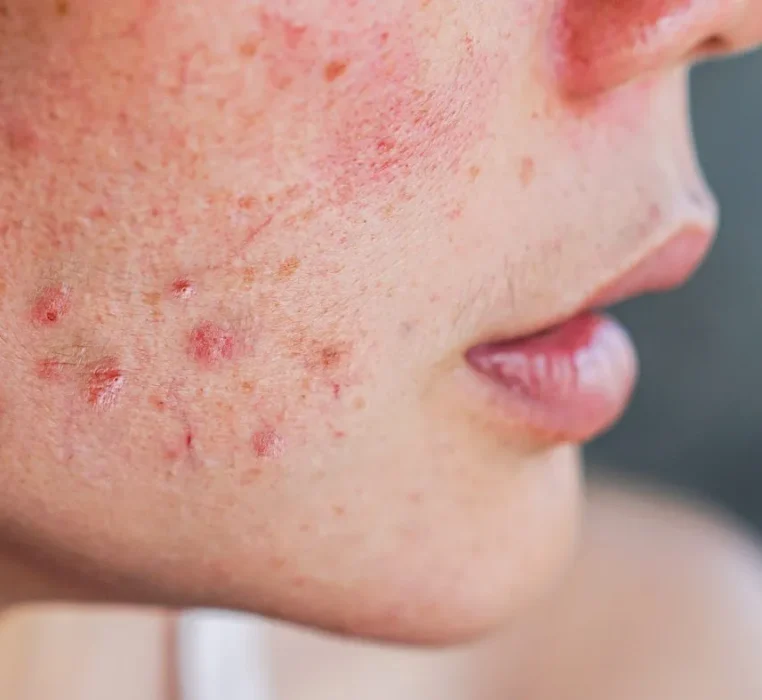
Acne,Weight gain
Understanding Acne and Weight Gain: Causes, Connection, and Management
Introduction
Acne and weight gain are two common health concerns that affect millions of people worldwide. Although they might seem unrelated at first glance, there is a complex interplay between these conditions, often rooted in lifestyle choices, hormonal imbalances, and other underlying health issues. This article delves into the causes of acne and weight gain, explores the connection between the two, and offers practical advice on managing these conditions effectively.
Acne: Causes and Triggers
Acne is a skin condition that occurs when hair follicles become clogged with oil, dead skin cells, and bacteria. It primarily affects the face, chest, and back, and can range from mild to severe. Several factors contribute to the development of acne:
- Hormonal Imbalances: Hormones play a significant role in the development of acne. Androgens, a group of hormones that increase during puberty, can cause the sebaceous glands to enlarge and produce more oil (sebum). This excess oil can clog pores, leading to the formation of acne. Hormonal fluctuations during menstruation, pregnancy, and menopause can also trigger acne in women.
- Genetics: Genetics can predispose individuals to acne. If your parents had acne, you might be more likely to develop it as well. Research suggests that genetic factors influence the size and activity of sebaceous glands, the body’s immune response to acne-causing bacteria, and the rate of skin cell turnover.
- Diet: Diet can also influence acne, though the relationship is complex. Some studies suggest that high-glycemic foods, dairy products, and processed foods can exacerbate acne. High-glycemic foods cause a rapid spike in blood sugar, which can increase insulin levels and, in turn, boost androgen production, leading to more oil production and acne.
- Stress: Stress does not directly cause acne, but it can exacerbate the condition. When stressed, the body releases cortisol, a hormone that can increase oil production, potentially leading to more breakouts.
- Poor Skincare Habits: Using harsh skincare products, not cleansing the skin properly, or over-exfoliating can irritate the skin and worsen acne. Additionally, not removing makeup before bed or using comedogenic products (which clog pores) can contribute to acne.
- Medications: Certain medications, such as corticosteroids, lithium, and some birth control pills, can trigger acne as a side effect.
Weight Gain: Causes and Triggers
Weight gain occurs when there is an imbalance between calories consumed and calories expended. However, the causes of weight gain are multifaceted and can involve more than just overeating. Understanding the underlying factors is crucial for effective weight management.
- Dietary Choices: A diet high in processed foods, sugary drinks, and unhealthy fats can lead to weight gain. These foods are often calorie-dense but low in nutrients, leading to overeating without providing the body with essential nutrients.
- Sedentary Lifestyle: Physical inactivity is a major contributor to weight gain. Modern lifestyles, characterized by long hours of sitting and minimal physical activity, can reduce the number of calories burned daily, leading to weight gain over time.
- Hormonal Imbalances: Hormones play a critical role in regulating metabolism and appetite. Conditions such as hypothyroidism, polycystic ovary syndrome (PCOS), and insulin resistance can disrupt hormonal balance and contribute to weight gain.
- Medications: Certain medications, including antidepressants, antipsychotics, and corticosteroids, can cause weight gain as a side effect. These medications may affect appetite, metabolism, and fat storage.
- Sleep Deprivation: Lack of sleep has been linked to weight gain. Sleep deprivation can disrupt the balance of hunger hormones, increasing appetite and cravings for high-calorie foods.
- Emotional Eating: Many people turn to food for comfort when dealing with stress, anxiety, or depression. Emotional eating can lead to overeating and weight gain, especially when high-calorie, sugary, or fatty foods are consumed.
- Age: As people age, their metabolism slows down, and muscle mass tends to decrease. This can make it easier to gain weight, especially if dietary habits and physical activity levels remain unchanged.
The Connection Between Acne and Weight Gain
While acne and weight gain may appear to be separate issues, they are often interconnected through underlying factors such as hormones, diet, and lifestyle choices.
- Hormonal Imbalances: Hormonal imbalances that cause weight gain can also contribute to acne. For example, conditions like PCOS involve elevated levels of androgens, which can lead to both weight gain and acne. Insulin resistance, often associated with weight gain, can also increase androgen levels, further exacerbating acne.
- Dietary Factors: A diet high in processed foods and sugars not only contributes to weight gain but can also worsen acne. Foods with a high glycemic index can cause insulin spikes, leading to increased oil production and acne breakouts. Additionally, excess body fat, particularly visceral fat, can lead to inflammation, which may contribute to acne.
- Inflammation: Both acne and weight gain are associated with inflammation. Obesity is characterized by low-grade chronic inflammation, which can exacerbate skin conditions like acne. Inflammatory responses in the body can increase the severity of acne and make it more difficult to manage.
- Stress and Emotional Factors: Stress and emotional well-being play a role in both acne and weight gain. Stress can trigger hormonal changes that lead to increased oil production and acne, while also promoting emotional eating and weight gain. Managing stress through healthy coping mechanisms can help in controlling both conditions.
- Lifestyle Choices: Sedentary lifestyles, poor dietary habits, and lack of exercise are common contributors to both acne and weight gain. Incorporating regular physical activity and a balanced diet can help manage weight and improve skin health. Exercise can reduce inflammation, improve insulin sensitivity, and regulate hormones, all of which can positively impact acne and weight management.
Management Strategies
Managing acne and weight gain often requires a holistic approach that addresses the root causes of both conditions.
- Healthy Diet: Adopting a balanced diet rich in whole foods, including fruits, vegetables, lean proteins, and whole grains, can help manage both acne and weight. Reducing the intake of high-glycemic foods, sugary drinks, and processed foods can improve skin health and support weight loss.
- Regular Exercise: Engaging in regular physical activity can help control weight and reduce the severity of acne. Exercise improves circulation, reduces stress, and helps balance hormones, all of which can positively impact both conditions.
- Skincare Routine: Establishing a gentle skincare routine that includes cleansing, moisturizing, and sun protection can help manage acne. Avoiding harsh products and using non-comedogenic skincare items can prevent clogged pores and reduce breakouts.
- Stress Management: Incorporating stress-reduction techniques such as meditation, yoga, deep breathing, or mindfulness can help manage both acne and weight. Reducing stress can improve hormonal balance, reduce emotional eating, and promote overall well-being.
- Medical Consultation: If acne and weight gain are severe or persistent, consulting a healthcare professional is essential. A dermatologist can provide tailored skincare advice and treatments for acne, while a nutritionist or endocrinologist can help address hormonal imbalances and develop a personalized weight management plan.
